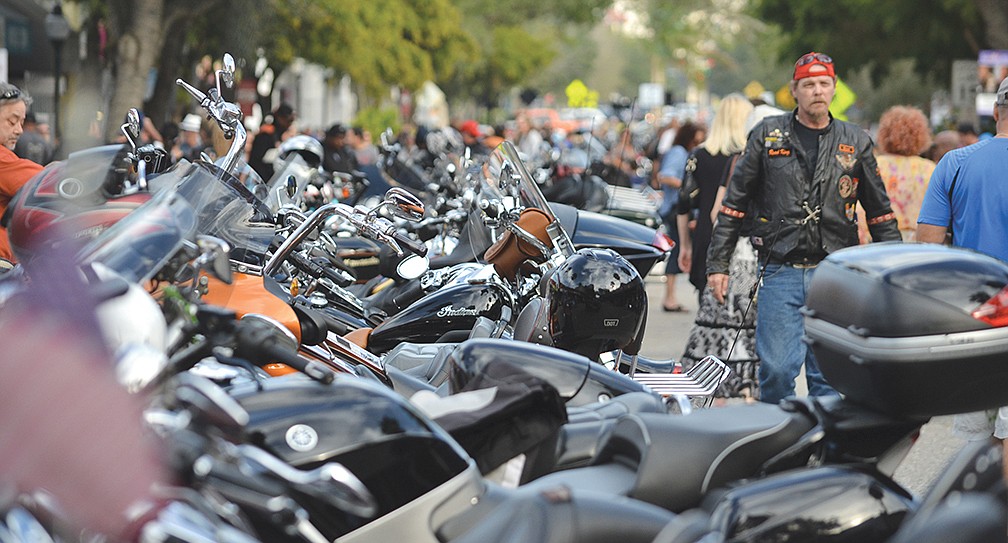- November 23, 2024
-
-
Loading

Loading

“The responses indicated that Thunder by the Bay was financially beneficial for 15 businesses. For 89 businesses, it was not good. For many, it was a disaster.”
— Norm Gollub, Downtown Economic Development Coordinator
Thunder by the Bay continues to reverberate.
When the city of Sarasota surveyed downtown businesses on how that weekend event affected them, an overwhelming majority said they don’t like it.
To be sure, you can understand the business owners’ displeasure. When they bought or rented their downtown storefronts, they did so with an expectation that their location would serve their business goals and aspirations and be a place to do business peacefully, profitably and devoid of undue disruption.
What’s more, many of these business owners might argue that a couple thousand motorcycles and their roaring engines over a three-day period don’t qualify exactly as peaceful. In fact, many of the downtown merchants and restaurateurs would argue Thunder by the Bay exacts harm — on their financial well-being and quality of life.
You can identify with them. You wouldn’t want 1,000 motorcyclists gathered on your neighborhood street in front of your home. You would scream at City Hall to stop the disruption. You might even demand some type of compensation for your duress. After all, isn’t that the American way? Sue someone.
But at the same time, everyone engaged in American life knows we all have the right to gather peacefully and lawfully — in someone’s home, in an auditorium, in a public park or on public streets. See First Amendment: “Congress shall make no law respecting … the right of the people peaceably to assemble …”
Which also is to say unexpected occurrences and the occasional disruption to routine — be they planned or spontaneous — are part of American life, part of our free society and human action. There is no such thing on Earth as paradise.
In short, there is no legal remedy to stop a peaceful (i.e. no violence or crime) gathering of motorcyclists.
At the same time, it should be noted, the city’s role in such gatherings is to monitor them and keep order, not to subsidize them with taxpayer dollars.
Which brings us to the standoff that occurs in thousands of communities throughout the United States: Those who see the benefits of attracting large gatherings of people to their communities and those who see large crowds as a disruption to their financial well-being and quality of life.
This dilemma is analogous to the 50-year struggle throughout all of Florida: dealing with population growth. Thunder by the Bay is a microcosm. As Adam Smith put it: “The most decisive of the prosperity of any country is the increase in the number of its inhabitants.” Or: The late Professor Julian Simon, an economist at the University of Maryland who devoted much of writing and research to the effects of population growth, concluded in 1981: “There are not now, and there never have been, any empirical data showing that population growth or size or density have a negative effect on the standard of living.”
But of course, you also have the arguments that population growth, or a sudden influx of motorcyclists, creates negative effects — traffic, street closings, noise, disruption to local businesses, etc.
One of the primary challenges, then, is to figure out ways that the positives of population growth or an influx of motorcycles outweigh the negatives. This is the challenge for Lucy Nicandri, Thunder by the Bay’s executive director and organizer, and her boss, the Suncoast Charities for Children board of directors. How can they turn downtown business owners affected by the event, as well as residents who don’t like it, into supportive fans?
They will never achieve 100% support. But as we wrote last week: “Collaboration and communication with all of the affected constituencies will be crucial, constructive and effective.” Such an effort can address how to make it better — e.g. location, time of year, how best to handle traffic, how to make beneficial for the maximum number of businesses.
To be sure, there always will be those who don’t want Thunder by the Bay, who believe the clientele doesn’t fit. But don’t kid yourself: Those older couples riding their big Harley-Davidsons are not gang members; many of them are wealthy doctors, lawyers and business people — the kind who have money to spend when they visit.
Or look at it this way: Thunder by the Bay, by comparison, creates nowhere near the inconvenience and disruption that the Firestone Grand Prix does in downtown St. Petersburg. For a month before the three-day races, that city erects miles of concrete fences downtown and during the weekend closes off multiple streets. And talk about noise.
In spite of this, the Firestone Grand Prix will celebrate its 13th season this March. The Grand Prix organizers and the city of St. Petersburg have figured out how to make it work.